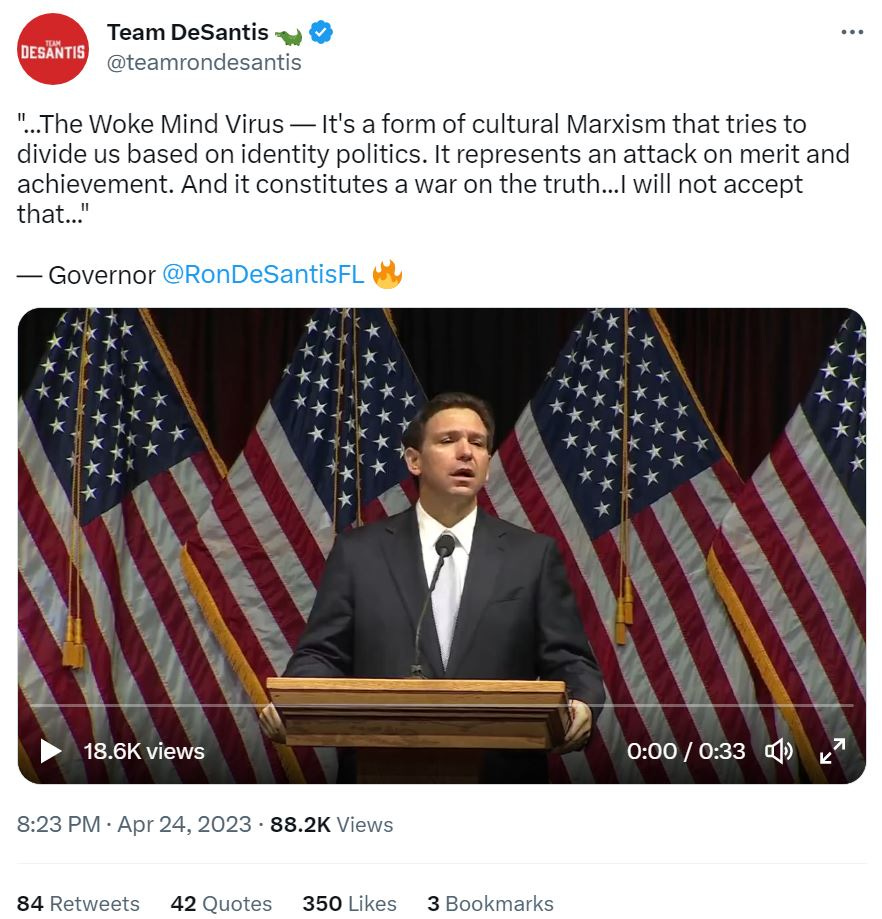Ron DeSantis Has an Elizabeth Warren Problem
Remember when the Massachusetts Democrat ran for president? Her campaign’s problems perfectly mirror Meatball Ron’s.
THE OTHER DAY I HEARD FROM a Democratic strategist with a particularly apt comparison for the DeSantis proto-campaign that was too delicious to be spoken aloud in polite lefty company and thus has been entrusted to me.
To date, the Florida governor’s limp launch has been most frequently compared to the Republicans who struggled to take on the Trump juggernaut in 2016.
Maybe Ron is a replica of Scott Walker, who similarly helmed a successful conservative governorship only to flame out on the national stage before the voting even started. Or maybe he’s more like Ted Cruz, a weird and unnatural political performer who has enough bona fides with the base to finish a gentleman’s second, but lacks the charisma to go toe-to-toe with the orange menace.
While there is a heavy whiff of both of those campaigns coming from Tallahassee—particularly Cruz, given the DeSantis super PAC’s reliance on expat strategists from the Texas senator’s 2016 effort—the more precise cautionary tale for Team DeSantis comes from the other side of the aisle.
Ron DeSantis is in danger of becoming Elizabeth Warren 2.0.
BEFORE THE “BOTH SIDES” POLICE turn on their sirens, let me just preface this by making clear that this isn’t about the merits of their respective policy proposals. Neither is it an attempt to claim that DeSantis and Warren are equivalent on any moral, intellectual, physical, or even metaphysical scale.
We are talking—purely and completely—about the raw mechanics of presidential politicking. And at that level, the underlying flaw in each of their early campaigns is the same.
DeSantis and Warren were both well positioned in the year before voting started on the basis of their broad, but shallow, popularity with party regulars. This support emanated from the fact that their base voters perceived both as pols who had success fighting for their interests and against the other side.
In both cases the generic elevator pitch for their campaigns was compelling.
Warren had taken on the big banks (remember, this was back before banks were all run by woke socialists ◔_◔) and other entrenched right-wing interests. Plus she promised to have “a plan” to fix the other Big Structural Problems facing society.
DeSantis’s value proposition is similar. He took on Big Fauci and the Pharma companies (which are now also run by woke socialists, I guess?) and has a proven record of standing up to the left. Plus, in Florida he got results on policy issues conservatives care about.
Here’s a page from a recent mailer his super PAC sent out in Iowa, summing up his pitch.
Okay. So far so good. People like fighting and solving problems in the abstract. But the devil is in the details and in providing them, Warren and DeSantis both ran into political problems.
Both decided that they had to accede to every whim of their respective super-online activist bases rather than stick with what was working for them.
Warren tried simultaneously to attract the most strident Bernie bros by belatedly embracing Medicare for All (and other lefty issues) while also checking every box demanded by the identitarian wing of the resistance: putting pronouns in her Twitter bio, branding merch with Latinx, and attracting the support of a group of activists named “Black Womxn For” (without actually gaining any meaningful support from Black WomEn).
DeSantis’s right-wing version has been much less earnest and well intentioned, but it’s just as out of touch. As a campaign prelude, Meatball Ron is presiding over a legislative session with a policy orientation more suited for Alabama than presidential battleground states. He’s tied himself to policies such as a six-week abortion ban and “constitutional carry” that even many Republicans don’t support. On top of that, his current stump speech requires a Ph.D. in based online discourse to have any idea what he’s talking about.
To wit: At a convention in Utah last week, DeSantis went off on wokeness, DEI, and ESG without even bothering to define these terms for his audience. Here are a few examples from DeSantis going over his policy objectives for this session.
“We are going to kneecap ESG in the state of Florida. . . . We are also going to be the first state to eliminate DEI. . . . We are going to prohibit the implementation in Florida of any central bank digital currency.”
He came back to these issues later in the speech, before closing with the most moronic attempt at Churchill hagiography since Nick Adams.
[We oppose] corporations pursuing a woke agenda with shareholder assets. We reject ESG. We reject woke banking. . . . We believe that ESG and the like is fundamentally wrong and we need to stop the woke from taking over our economy. Yes, we will fight the woke in the legislature, we will fight the woke in the schools, we will fight the woke in the corporations, we will never surrender to the woke mob.
Central bank digital currency and shareholder asset concerns! That’s populism, baby.
And then there’s this bit on cultural Marxism, which is totes a top concern among voters in Ankeny:
DeSantis has also launched himself at every culture war fight to hit Twitter in the last six months, from daring the government to come and take his gas stove to obsessing over whether Disney characters are gay to a ludicrous crudités-esque grocery-store interview with conservative meme warrior Benny Johnson in which he claimed he will never again drink Bud Light as a result of a single social media promotion featuring a trans person. (So, you know, back to pumpkin-peach IPAs for Ronald Dion, I guess.)
These attempts to please the most social-media-brain-poisoned posters in their respective bases might have seemed like a good strategy on its face. It’s good for #engagement numbers, and campaigns can convince themselves that there are real-life people who are influenced by these influencers.
The actual result for both? Lots of praise from highly educated nerds who tweet obsessively about politics or are paid to create content for partisan outlets—and from everyone else a sense that the candidate is a creature from another planet.
Add in the fact that Warren and DeSantis share an Ivy League mien, and the result is candidates who look good on paper but don’t end up connecting with normie, pragmatic voters searching for a horse who can win it all.
DESANTIS HAS TIME TO REORIENT his pitch. In 2019, it seemed as if Warren might be uniquely positioned to bridge the Bernie and Biden wings of the party. She ended up getting squeezed on both ends: not authentically Bernie enough for the comrades, a little too out there and unelectable-seeming for the normie Dems.
As the 2024 race now stands, DeSantis could avoid that same squeeze because he has no Joe or Pete or Amy on his normie flank. But the more he founders, the more likely it is that such a challenger newly appears (Youngkin/Kemp) or emerges from the existing single-digit rubble (Haley/Scott/Hutchinson).
But DeSantis also faces a danger from his right. If he doesn’t stabilize his position, then it is entirely possible that a different bridge candidate could jump in and demonstrate more deftness at appealing to Trump’s voters without seeming like an overly ideological weirdo to barstool bros. One such person became available on Monday, as it happens.
To avoid that fate DeSantis has to rediscover what got him to the top of the polls in the first place: A generic brand that led GOP primary voters to believe that he will fight for them and win, not an obsessive focus on addressing the insane concerns of Catturd2 and the randos paying $8 a month for a meaningless blue tick.





